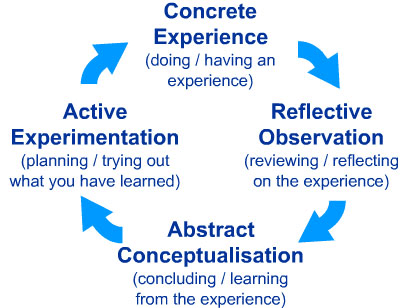FAQs
Reflecting on a work experience is a crucial piece to personal growth and bettering yourself for your next placement. Kolb’s experiential learning style theory explains the four stage learning cycle (starting with a Concrete Experience):
The reflective observation piece is the bridge that will allow you to conclude and talk about your placement while drawing on key learning moments that shaped your experience. Going through the reflection process will also allow you to assess a situation and identify what you did well and how you could do things better.
Try to answer these questions during and after your placement in order to assess yourself and reflect on your experience:
- What was my biggest personal take away from my work placement?
- What was my most significant accomplishment during my work placement?
- What was my most significant challenge during my work placement?
- What skills have I learned from my work placement?
- What areas could I improve on for my next work placement or professional experience?
- How does this work placement fit into my career path/journey?
Sharing your reflection can be a great way to initiate a conversation with your supervisor about what you’ve been enjoying working on thus far, or areas of work you’d like to explore. While your supervisor may be assessing your performance during and after your work placement, sharing some of your takeaways can be beneficial as long as it stays positive and solution-driven. Opening up this channel of communication can reinforce your relationship with your supervisor and lead to new opportunities and new directions.
Communication is key when it comes to finding a solution to a problem. Before initiating a conversation, think about your goals and the issue that needs to be addressed. What are you hoping to come out of this conversation? What are the facts of the situation? How might your supervisor react? How would you react? When you decide to initiate the conversation, be clear about the intentions and remind yourself and your supervisor that you are both solution-oriented and have shared goals in mind.
During the discussion, you may want to use the STATE methodology:
Share your facts
Tell your story
Ask for their view
Talk tentatively
Encourage testing
Through this methodology, you are staying calm in your explanation, staying solution-oriented, and accountable. At the end of your meeting, summarize together what you have discussed and outline next steps as applicable.
Before deciding to leave a co-op placement or internship, think about contacting your Coordinator. They will be able to help you problem-solve the situation or give you guidance on what options are available to you.
Start by preparing a few talking points before meeting your supervisor to discuss the possibility of future employment. List your achievements and accomplishments to refer back to, and explain how you’ve grown or what you’ve learned. Relate these back to your career goals and explain why working full time for your supervisor would benefit not only yourself but the organization. Outline how your values align with the organization’s, and show gratitude for the experience thus far. If the answer is negative, be respectful and appreciative for the experience you’ve had so far.

